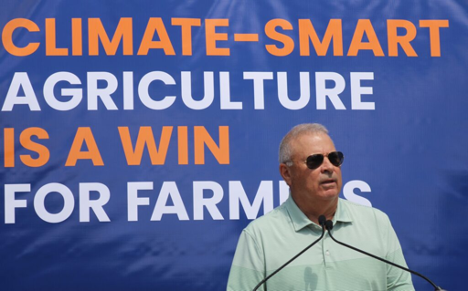Op-ed by Wilson, NC Livestock Farmer R.C. Hunt

Climate-smart practices preserve farmland
Wilson livestock farmer R.C. Hunt speaks at a May 21 press conference seeking congressional support of farmers’ conservation efforts. Drew C. Wilson | Times file photo
When you reach 70 years of age in your life, you’ve gone through a tremendous evolution. You’ve watched your industry develop, grow and mature. You understand the key for it is to have a continuation.
I grew up on a tobacco farm and entered the livestock business after graduating with an animal science degree from North Carolina State University in 1977. In the 1990s, my business partner and I bought a farm in Wilson County. The farm had been used intensively for crop production. We put a 2,000-sow farrow-to-wean swine facility on the land in 1992, which has operated every day since.
The swine operation sits on a 400-acre tract of land with streams and creeks that border or run through it. It’s a beautiful place. I made the decision, and maybe not the most economical decision, early on to complement my pigs with cattle.
At that time, we started designing our animal waste lagoon. We were able to participate in a state cost-share program that brought engineers to the table to make sure we built the lagoon right. We needed to make sure the lagoon was put in a good spot, looking at the soil type, packing and layering to make sure excess nutrients wouldn’t leach into the soil. We wanted to produce pigs efficiently, but we also wanted to do right by our environment.
The land previously had been used for crops, but it was worn out. We converted the cropland to pasture and used waste from the pigs to fertilize it. With rest and nutrition, the land has recharged. It’s been amazing to watch. The land improved so much that, after 25 years, we put some of it back into crop production. The corn grows twice as tall now. Everything you plant yields twice as much. So, I have found, you really get a benefit if you give the land a rest — if you put it in pasture and conservation, at least for a time.
The farm has been extremely productive over the last 30 years. It’s produced a lot of pigs and cattle, a lot of economical pork and beef for consumers in the U.S. and abroad. But today, the technology is old. The people are old. It’s time for me to retire.
We like to say we own the land, but truly, we just manage it for the period of time we’re on this earth. I’ve done my best to generate as much production as I could. Now I am thinking about what happens to it next.
By the end of December, the plan is for the swine operation to close. But what do we do with the lagoon? Our goal is to clean it up and convert it into a freshwater pond that can be used as a water hole for future farming or irrigation.
It’s going to take more than $300,000 to do it right, mostly because we, and most farmers, don’t have the sophisticated equipment needed. Those who do have the multimillion-dollar machines are in short supply. It’s basically a necessity for the farmer to have some help doing this well. That’s why I applied for and received a climate-smart agriculture project grant through NRCS’s EQIP program.
Once the process gets going, it should only take 30-60 days. And the last of our pig waste will be spread across 900 acres of corn in our area. I’ve already contacted a couple of farmers who are glad to be able to utilize our existing nutrients instead of going out and purchasing commercially made fertilizer. We’re finding that the micronutrients at the bottom of our lagoon are the exact micronutrients that have been depleted in the soils of intensively cropped land.
It is certainly important to protect climate-smart agriculture.
Thanks to the Inflation Reduction Act, roughly $19.5 billion was allocated to the U.S. Department of Agriculture conservation programs designed to help farmers be part of the solution to address climate change. As the House and Senate agriculture committees consider reauthorization of the Farm Bill this year, I encourage members of Congress to protect funding intended to support farmers doing their best on and for the land.
That support is more crucial now than ever. When we do better on the land, that only benefits the community, too.
R.C. Hunt, a hog farmer from Wilson, is a past president of the National Pork Producers Council. In addition to hogs, he raises cattle, runs a fish operation and farms 1,000 acres of cropland.


